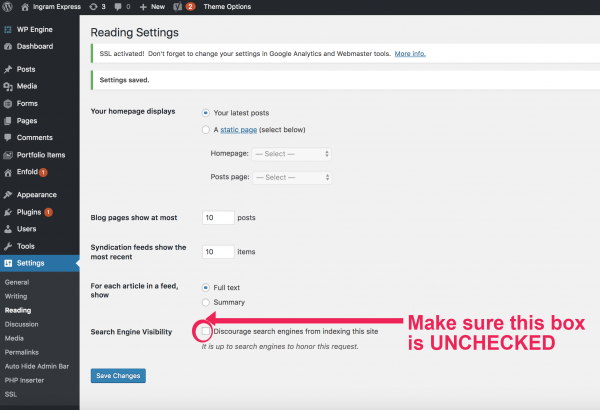“The worms crawl in, the worms crawl out, the worms play pinochle on your snout” – Lyric from The Hearse Song, unknown origin
It’s that time of year again. Halloween calls to mind spooky imagery of all kinds, sending shudders down the spines of adults and little ones alike. It’s all in good fun, of course. Read on for some scary (and some more cringeworthy) stories shared by SEO professionals about SEO horror stories and errors that arise as a matter of course during their daily work.
Kill Switch for SEO – WordPress is out to get you
“He made himself the cure, which wouldn’t have been necessary if he hadn’t also created the disease.” ― Penelope Douglas, Kill Switch
Very often when you face a Google crisis, like having none of your website pages appear in the index, it is your own fault. For example, if you have a WordPress website, there is a common but sinister mistake you can make that will prevent your site from appearing in Google search, effectively killing your SEO. This often-missed step in publishing sites is unchecking the “discourage search engines” box available on the back end of WPEngine. Without selecting this option, your site won’t be indexed by the search engine giant. What a nightmare that would be… and an embarrassment to explain to a client! Go to Settings->Reading and find the box to uncheck as shown in the image below.

Mysterious Competitors—Nefarious alterations to GMB listings
“The world is full of obvious things which nobody by any chance ever observes.” ― Arthur Conan Doyle; Corrections And Editor Edgar W. Smith; Illustrators, The Hound of the Baskervilles
Do you have a Google My Business listing? If so, beware of the scary possibility that a competitor could edit your listing. Merchants and business owners are notified by email when someone suggests a change to your listing, but only primary account owners will receive this notification. Anyone who manages the GMB account will not.
What does this mean for you? If you own the business and signed up for the GMB account, but your COO handles daily operations, they’ll never know that some n’er-do-well has suggested nefarious changes to your GMB listing.
Furthermore, some business owners have reported that they do receive emails about suggested changes, but that the changes are already live by the time they have a chance to investigative. That could mean very scary things for your business! The best thing to do to collar these mysterious changes is to log on regularly to your GMB page and look at the Info section to see if there are any pending changes.
Ghost Metrics – Scaring yourself
“In one aspect, yes, I believe in ghosts, but we create them. We haunt ourselves.” ― Laurie Halse Anderson, Wintergirls
It’s essential to track your website metrics to ensure that good keywords are being used and that you make appropriate changes over time. But what happens when the keywords you’re using were never the right ones to begin with? For example keywords might have ghost metrics if:
- The keywords you are tracking for rankings are popular within your organization, but had very little search volume in the real world
- The rankings for the keywords you are using appeared high because your company leaders were spot-checking these keywords while looking at personalized Google search results and not the universal results.
- A lead production decline was more a matter of feel than a matter of fact — because your company had no process to track lead sources and thus no reliable data on which to base its evaluation.
By failing to populate your site with high-performing keywords, your ad campaigns, on-site text, and social media efforts might all be for naught. How horrifying is that?
Ghost Links—The friendly ghost
“Now I know what a ghost is. Unfinished business, that’s what.” ― Salman Rushdie, The Satanic Verses
What are ghost links, you might ask? Also known as dead links or link echoes, these are links on other websites that pointed to your website at one time, but that have since been deleted. While many casual website owners (and purported SEO experts) believe that these links have no bearing on your ranking in search, that’s actually far from the case.
In fact, ghost links continue to factor in to the Google algorithm, even once they have been removed. What does this mean for your SEO? Well, believe it or not, ghost links can help, rather than hinder your ranking in search. It’s theorized that Google still views them as useful signals and senses an intrinsic value in them, much like a ghost. So, if you see some important links disappearing, don’t panic. Their spirit might still help with your SEO ranking.

Haunted Website—Everything is not what it appears to be to Google
“Some people can’t see the color red. That doesn’t mean it isn’t there,” she replied.” ― Sue Grafton, M is for Malice
Have you ever heard of cloaking? While this sounds like it might be some sort of epic, haunted spookiness, cloaking is actually an SEO term. Essentially, this technique occurs when the content or information a user to your site sees is different from what the search engine crawlers see. Often the intent of cloaking is the mistaken belief that it can help a site to achieve superior rankings.
While there are benefits to cloaking, done badly it is actually considered a violation of Google’s webmaster rules. As such, it’s not a practice that is recommended, much like other so-called spamdexing techniques and search engine optimization errors.
Zombie Content—The living dead can kill your SEO
“This is the way the world ends; not with a bang or a whimper, but with zombies breaking down the back door.” ― Amanda Hocking, Hollowland
Content that dies can come back from the dead to devour your SEO rankings. Google measures engagement across your whole site – and if this living dead content drags you down into the grave of low engagement metrics, your traffic goes with it. Some of things you can do to avoid this is:
- Rewrite or delete old content that has little traffic or huge bounce rates
- Redirect or optimize auto-generated pages like categories, tags, and author pages. These thin content pages can be a real drag.
- Don’t publish awful user generated content. If you don’t have active contributors providing quality content, posts, or comments – get rid of it.
- Don’t optimize for the wrong keywords. If you use the wrong keyword for a piece of content that doesn’t address the intent of the searchers, they will leave quickly. Like anyone seeing a zombie would.
- Monitoring your internal links and 404 pages. People clicking on dead links lead to poor user engagement.
Remember, your site needs to have living and engaging content. Zombie content is just a bloody mess.
SEO is Dead—But it keeps rising from the grave
“And therefore never send to know for whom the bell tolls; It tolls for thee.” John Donne
Neil Patel, a recognized expert in the SEO space, notes how search engine optimization has been eulogized repeatedly since its inception, but that it never really has died. It’s still essential that you follow proper procedures regarding keyword use, backlinks, social media presence, Google business listings, and internal links. Having the right user-facing content and search crawler-facing metadata is essential to getting your content seen and staying on the front lines. No matter what you may read or hear, SEO is not dead. It’s merely forever evolving.
SEO Horror Stories Conclusion
“From even the greatest of horrors irony is seldom absent.” ― H.P. Lovecraft, Tales of H.P. Lovecraft
When it comes to search engine optimization, having the right strategy is more important than moving quickly. SEO can be a scary concept if you’re unfamiliar with the territory, much like trick or treating in someone else’s neighborhood under a full moon. It’s better to buddy up; there’s no sense in trying to go it alone.
Galileo Tech Media offers a variety of solutions to your SEO fears. Fight back against everything from simple errors to malicious reviewers with a thorough strategy devised by a trusted partner. Talk To Us!

